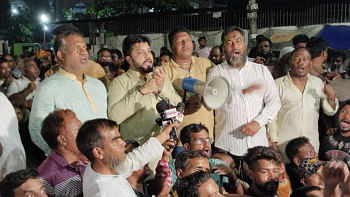Will open-door recruitment improve university education?

The Academic Experience Project is a faculty-student collaborative work aimed to glean insights about the experiences of tertiary-level students. Each Friday, The Daily Star publishes an op-ed highlighting its findings. This is the tenth article of the series.
The higher education sector in Bangladesh has seen rapid growth in recent years with 154 universities now in its list. Yet, only two institutions have made it to the top 200 in the recent QS Asia University Rankings. In the Times Higher Education World University Rankings, the results are more dismal. At the same time, countries in the neighbourhood have seen the inclusion of new universities with a clear rise in rankings. Of course, the overall quality of higher education in Bangladesh comes into question.
The problems with the quality of higher education in Bangladesh are manifold: lack of proper infrastructure and technology, lack of funding, lack of new and innovative programmes, gap between what is taught and what is practiced in the real world, lack of research, and most importantly, lack of good quality faculty.
Students realise they have little to no say in the selection of faculty, the workings and priorities of their universities, as well as their policies and decision-making criteria to ensure the quality of education they seek for themselves. However, they also recognise that quality faculty members who have the interests of students at heart can be transformative in helping them prepare for the future.
There have been allegations of faculty members in public universities not being recruited and promoted on the basis of their merit, but on the basis of their political inclination. Also, public universities seem to recruit faculty who are valedictorians and alumni of their own institution. In world-renowned universities, recruitment of their own graduates is seen as inbreeding that offers little opportunity to widen the knowledge net. Thus, they recruit faculty from "other" universities with the expectation that they will add new dimensions to the knowledge pool to enrich students.
In contradistinction, when it comes to our public universities, there seems to be little consideration for applicants who apply from outside, even if they are specialised in their fields through research and publications. The situation is no better in the private universities; many of them are inclined to get the job done with part-time teachers to keep their costs down. Hiring international faculty with attendant costs seems to be an absolute no-no. It may be noted that universities in Singapore, South Korea, Malaysia and Hong Kong, for example, all rose to prominence by keeping their doors open to foreign faculty who can bring with them a whole set of new learning-teaching experiences.
Importantly, students participating in the Academic Experience Project felt that teachers ought to be recruited based on their qualifications, with priority given to individuals with higher degrees, publications, continuing research, and solid experience—not based on their networks and political connections. Teaching and classroom engagement styles of faculty applicants should also be critically evaluated by the university administration, faculty peers, and even the students since they are the end users of this service. Periodic, regular, and stringent appraisals of the faculty members need to be conducted where everyone from the university administration to the students can provide feedback. It is also crucial that such feedback is used to help develop the teachers, while creating a wholesome teaching environment wherein faculty members cannot take their positions for granted, an unfortunate practice in many public universities.
Regular training for all faculty members, irrespective of their seniority and positions, are an absolute necessity. This will keep them in touch with modern andragogy (the science of how adults learn). What can't be emphasised enough is the importance of research and publications in the making of a quality faculty member who is not only a disseminator but also a creator of knowledge. Universities should emphasise the importance of research and publications in the world's ranked and indexed journals since it showcases their expertise in their respective fields—a vital quality of an educator. It is important to emphasise that the reputation of a university is determined and enhanced to a large extent by faculty contribution to both the quality and quantity of knowledge they generate.
Bangladesh is in a unique position to take advantage of the diaspora scholars who are interested in returning to Bangladesh with solid experience and credentials. Many of them are routinely turned down, which extinguishes their desire to give back to the nation. Bangladeshi scholars living abroad can be invited for a few semesters to share their expertise and knowledge. The University Grants Commission (UGC) should also encourage the universities to invite foreign professors on a contractual basis to teach graduate courses, especially where they do not have senior academic staff. A quota may be created for the universities to be filled by those with academic experience in recognised universities overseas.
Retired civil servants and other professionals who are experts in their fields can be similarly engaged as professors of practice to leverage their expertise and gain practical insights about industry, civil administration, etc. Collaboration with top-ranked universities abroad (the Singapore model) and faculty exchange programmes will also go a long way in improving the quality of education in the higher educational institutions in Bangladesh.
World-class universities can be built quickly as evidenced by The University of Peking, which is 24th in the Times Higher Education World University Rankings of 2020. The National University of Singapore (NUS), POSTECH university in South Korea, and many others have also attained global recognition within a short span of time.
All it needs is the right vision and the willingness to establish a few flagship universities as a starting point with a mix of local and qualified foreign faculty. As reputational capital improves, faculty motivation is likely to resurge in our universities to play the knowledge game at a higher level of engagement and intensity with peer institutions. As a result, not only will the nation gain from it, students too will go on to become global citizens and fill the ranks of competent employees engaged in building enterprise and pathways to Bangladesh's middle-income status.
Tahmina Islam is working on her MBA degree at IBA, University of Dhaka. Syed Saad Andaleeb is Distinguished Visiting Professor at IBA, University of Dhaka, and former Vice-Chancellor, BRAC University. For more information on The Academic Experience Project, contact Dr Andaleeb at [email protected].

 For all latest news, follow The Daily Star's Google News channel.
For all latest news, follow The Daily Star's Google News channel. 



Comments